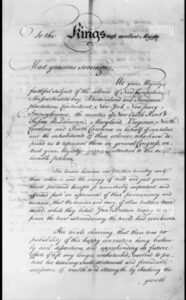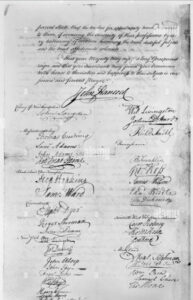On July 5, 1775, the Continental Congress approved the Olive Branch Petition, penned by John Dickinson. The document appealed directly to King George III, expressing a desire for reconciliation between the colonies and Great Britain. Dickinson, who sought to avoid a complete rupture with Britain, framed the colonies’ resistance to British policies in the following terms:
“Your Majesty’s Ministers, persevering in their measures, and proceeding to open hostilities for enforcing them, have compelled us to arm in our own defence, and have engaged us in a controversy so peculiarly abhorrent to the affections of your still faithful Colonists, that when we consider whom we must oppose in this contest, and if it continues, what may be the consequences, our own particular misfortunes are accounted by us only as parts of our distress.”
By framing their grievances in this manner, Congress sought to convey to the king that the American colonists’ discontent was directed at his ministers’ policies, rather than his own leadership. The petition concluded with a declaration of loyalty to the crown, emphasizing their continued allegiance to the monarchy.
“That your Majesty may enjoy long and prosperous reign, and that your descendants may govern your Dominions with honour to themselves and happiness to their subjects, is our sincere prayer.”
By July 1776, the Declaration of Independence presented a starkly contrasting view, condemning King George III’s reign as a series of abuses aimed at establishing absolute tyranny over the colonies. This marked a significant turning point in American sentiment, evident in Congress’ deliberate choice of language. They instructed Thomas Jefferson to exclude any phrasing that implicated the British people or Parliament, emphasizing that the conflict’s basis had shifted. Initially, the colonists’ grievances were directed at Parliament, with the king still seen as a benevolent leader. However, the Declaration of Independence signaled a radical shift, as Americans began to view the monarch himself as the primary source of oppression.
The colonists’ faith in King George III’s benevolence was shattered when he refused to even consider the Olive Branch Petition. They had hoped that the petition would reveal the truth – that Parliament’s restrictions on their rights were made without the king’s full awareness, and that he would intervene on their behalf. However, the king’s refusal to acknowledge the petition made it clear that he was complicit in Parliament’s actions.
This realization, combined with the publication of Thomas Paine’s influential pamphlet Common Sense in January 1776, further fueled the colonists’ anger and determination. Paine’s scathing critique of the monarchy, which he argued had enabled tyranny and chaos, resonated deeply with the Americans and strengthened their resolve for independence




























































